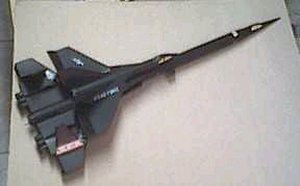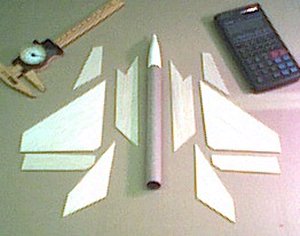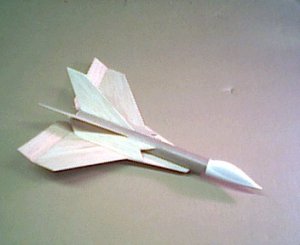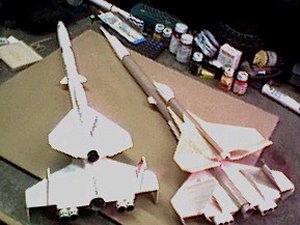Scratch Transglobal Interceptor Original Design / Scratch Built
Scratch - Transglobal Interceptor {Scratch}
Contributed by Gordon Agnello
| Manufacturer: | Scratch |
Construction: These are all Estes parts except for the 10.5mm scram jet tubes from Apogee Components 1 - PNC-50SP "Venom" Nose Cone After sealing ALL that wood, the finish is gloss black followed by the decals (gloss is better for applying decals) followed by a coat of Testors dull Coat to give it the flat black military look. Flight: Well, I finally got the courage to put a C6-5 in it for the final "test" flight. All I can say was WOW! I did the 1000and1, 1000and2, count down on the glide and was absolutely delighted that the Orbiter made an excellent glide of over 30 sec. Not bad for a "new" untested design. After three flight I am happy to report absolutely NO damage. I did fly it in some pretty tall weeds, so that helped. Cons: Well, there is a LOT of lumber to face on this project, lots to cut out, lots to sand and lots to seal. Well worth the effort! Other: Brief:
Brief:
This was an idea knocked about in the chat room on The Rocketry Forum one night and this is what I came up with the next day. Essentially, this is a military version of the Estes Orbital Transport. Boost is a normal vertical take-off with a glide recovery for the Orbiter and a parachute recovery for the Booster.
This is no 3FNC model!
1 - PNC-20 "Space Racer" Nose Cone
1 - 18" BT-50 (Booster)
1 - 6.75" BT-20 (Orbiter)
1 - 2.75" BT-20 (Engine tube)
1- set of engine mount parts (motor hook, engine block and 2 2050spacers)
6 - 1.25" BT-10.5mm scarm jet tubes
21" x 3" sheet of 1/16" balsa
36" x3" sheet of 3/32" balsa
2 fin pattern sheets
2 - 1" launch lugs
1 - 12" parachute
1 - 18" shock cord and mount
1 - 18" length of Kevlar line
1 - Monagram/Revell X-15 decal sheet provided by JimZ The build is straight forward level 4 construction. All the balsa parts must be cut out from the pattern sheets. There is a LOT of lumber here! Provided all the parts are cut out properly the fit and shape of the final product is fairly easy...although a lot of work. Nothing unique or unusual.
The build is straight forward level 4 construction. All the balsa parts must be cut out from the pattern sheets. There is a LOT of lumber here! Provided all the parts are cut out properly the fit and shape of the final product is fairly easy...although a lot of work. Nothing unique or unusual.
I used the motor recommendation from the Estes Orbital Transport. The motor is retained by an engine hook (The "old style Estes hooks are now available from Balsa Machining Services). Three sheets of recovery wadding to protect the 12" chute and stuff the chute shock cord and Kevlar into the nose put the Orbiter in place on it's retainer lug and she's ready to go. The first two flights were with a B4-2 motor and the boost was more than acceptable although only about 300'. Some minor glide trim adjustments on the Orbiter resolved a slight "stalling". (just added a smidge of clay to the nose). The second flight on the B4-2 was very pleasing with a nice long glide and normal booster recovery.
The first two flights were with a B4-2 motor and the boost was more than acceptable although only about 300'. Some minor glide trim adjustments on the Orbiter resolved a slight "stalling". (just added a smidge of clay to the nose). The second flight on the B4-2 was very pleasing with a nice long glide and normal booster recovery. Summary:
Summary:
Pros: I am soooo pleased! this is my baby so I gotta give it a 5 out of five. Nothing unusual on the construction. I recommend that you build the new Estes reissue Orbital Transport first to understand all the basic construction techniques but, like I said earlier...nothing unusual here. The flight has to rate a full 5 in my book too.
I have enough supplies together to make a few kits of this project. (The special nose cones make it hard to reproduce) The kits are complete right down to the waterslide decals. They sell for $30 each plus $4 shipping. Email me at gagnello@yahoo.com if you are interested.
 |
 |